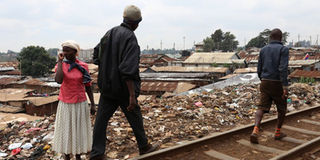Kenya ranked sixth on extreme poverty index

Kibera residents walk along the train tracks that pass through the slum. FILE PHOTO | BILLY MUTAI |
What you need to know:
- Country fails to use growth to end deprivation.
- Report says radical measures needed to pull 18 million out of destitution.
Kenya has been ranked sixth among top 10 countries in Sub-Saharan Africa with large populations living in extreme poverty.
And the country will not be able to combat poverty by 2030 unless radical measures are taken to rescue the 18 million people under the poverty line, says a study by the Institute of Security Studies.
The other countries with the largest populations of extremely poor people are Nigeria, Democratic Republic of Congo, Tanzania, Ethiopia, Madagascar, Uganda, Mozambique, Malawi and Burundi in that order.
All the countries but Burundi have populations of more than 10 million living in extreme poverty — in total, 272 million people in the 10 countries face extreme poverty.
The study, Reasonable Goals for Reducing Poverty in Africa - Targets For Post 2015 MDGs And Agenda 2063, says failure to reduce poverty is threatening Kenya’s economic success.
The study further reveals that although Kenya and other Sub-Saharan countries like Cameroon, Egypt, Ghana, Mali, Mauritania and Senegal have experienced exponential economic growth, they have failed to translate this growth into poverty reduction.
Authors Jakkie Cilliers, Sarah Turner and Barry Hughes said although Kenya and many other African countries hoped to end extreme poverty by 2030, many would miss the target.
LONG WAY
Speaking on Wednesday after the launch of the report in Nairobi, Mr Cilliers said because Kenya was relatively unequal, with growth restricted to urban areas, the country still had a long way to end poverty.
He said a high population increase, mismanagement of resources and setting of short term goals by politicians to win elections were also contributing to the slow elimination of poverty.
“Poverty will come down at a relatively brisk rate but the country will not reach the goal of alleviating poverty by 2030,” he said.
“Kenya needs to invest more in basic education, infrastructure and in finding a way to get to the poor,” added Mr Cilliers.
He said though devolution hoped to improve life, a lot of money was being sucked up by county governments through mismanagement.
The researcher called on the civil society to help check abuses in counties and make politicians accountable.
But all is not lost. Mr Cilliers said Kenya could put more effort into increasing government spending on welfare, tax redistribution and ending corruption.
“With pro-poor policies that try to provide social assistance and other support to rural and poor people, Kenya can fairly quickly enjoy a massive reduction of poverty while growing its economy and reducing inequality,” said Mr Cilliers.





